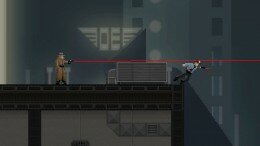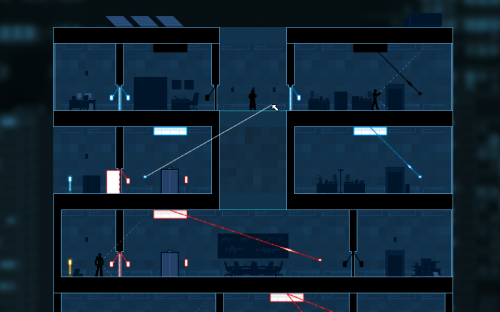
Gunpoint

Overview
Platform: PCYou’re no superhero, you’re just a man like any other; a single bullet can end it all.
Gunpoint is a game which will thrust you into the role of the archetypal hardboiled detective. It’ll allow you to feel dangerous, let you play a street-smart tough guy that can handle himself in a fistfight. Yet, at the same time, it’ll make you feel vulnerable. You’re no superhero (well, you can climb up walls and jump on top of a building in one leap, but ignore that for a second), you’re just a man like any other; a single bullet can end it all. The odds are against you and if you want to come out of this mess alive, you’re going to have to use your smarts, you’re going to have to outthink your enemies.
If you’re anything like me, the mention of the world ‘hardboiled’ will already have peaked your interest. If that’s the case, Gunpoint might be for you. If that’s not the case, Gunpoint might still be for you, because it’s a bloody good game. Let me tell you why.
You take on the role of Conway, a trenchcoat wearing freelance spy, and owner of a special pair of trousers which allow him to leap on to the side of buildings, smash through windows, or jump atop guards. The central mechanic around which this cyberpunk tinged stealth puzzler centres however, and the one which makes Gunpoint so fun to play, is not Conway’s special jumping trousers, but his ability to rewire electronics.
A simple role of the mouse wheel will switch your view to one in which you are able to see the connections between all the electrical devices in any given level. A light switch, for example, will have a line which connects to a light. You can take hold of that connection with a click of the mouse and drag that line to connect the light switch to another device so that, for example, the light switch will open a door, call an elevator or, if you want to be dull, switch off a different light.
Complexity is layered as you progress through the game by throwing a larger variety of electronic devices into the mix and by introducing different coloured circuits which can only be connected to devices of the same colour. It might sound a little confusing, but once you’ve got the game in front of you it’s all very intuitive.
More importantly, bending Gunpoint’s levels to your will through electronic mastery is also incredibly satisfying, particular when using your abilities to create slapstick traps for the guards patrolling a level; the thwack which accompanies the closing of a door in an unsuspecting guard’s face never gets old.
The game generally provides well for multiple solutions too, so there is room for experimentation and a variety of approaches to each level: you might choose to smash through a window and land atop a guard before punching him into unconsciousness. Alternatively, you might find more satisfaction in the quiet approach, rewiring a level so that a guard unwittingly opens a door for you, before you switch out the lights and sneak around him in the darkness.
However, despite the provision for a slightly more reckless approach, Gunpoint is a game which generally demands that you outthink your adversaries. Being spotted by a guard usually results in a one shot kill and while Conway’s pretty swift on his feet, his ability to jump vast distances and hang from walls and ceilings is better employed to facilitate a brand of fast paced stealth than to support a more aggressive approach. That’s a good thing – Gunpoint’s focus on stealth complements and supports its puzzle element well, encouraging the player to find pleasure in completing their objectives using their smarts, rather than brute force.
If my earlier mention of Gunpoint’s provision for slapstick has led you to believe that Gunpoint might not be a game which takes itself seriously, you’d be correct. I’ll avoid going into details of the plot, suffice to say that Gunpoint’s tale of espionage is incredibly self-aware, poking fun at the somewhat clichéd web of complex double and triple-crosses that one would expect to find, and indeed gets, in this genre piece.
The narrative is delivered in short text message exchanges between each level. There’s nothing groundbreaking about the story — in fact, it’s pretty derivative — but I don’t think that’s what creator Tom Francis is aiming for. Rather, these short exchanges serve as a means for Francis to showcase his very well written and amusing dialogue.
The only real disappointment with Gunpoint is its length. Gunpoint took me less than three hours, and while unlockable abilities facilitate replays of earlier levels for better scores, there is a sense when you get to the end of the game that there’s still room for growth in Gunpoint’s brilliant rewiring mechanic. As such, one can’t help but wonder if the end result is a great idea which is a little underutilised. Still, they say you should always leave them wanting more, and Gunpoint certainly does that. Given that Gunpoint is available for less than seven quid, I can’t say that I felt short-changed and certainly wouldn’t hesitate to recommend this game.






